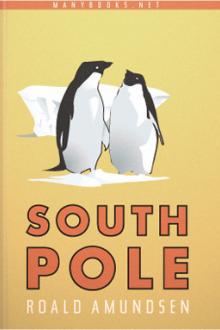A Book of Discovery by M. B. Synge (the snowy day read aloud txt) 📕

- Author: M. B. Synge
- Performer: -
Book online «A Book of Discovery by M. B. Synge (the snowy day read aloud txt) 📕». Author M. B. Synge
The fall of Malacca was one of vast importance to the Portuguese. Was it not the key to the Eastern gate of the Indian Ocean—the gate through which the whole commerce of the Spice Islands, the Philippines, Japan, and far Cathay passed on its road to the Mediterranean? Was it not one of the largest trade markets in Asia, where rode the strange ships of many a distant shore? The fame of Albuquerque spread throughout the Eastern world. But he was not content with Malacca. The Spice Islands lay beyond—the Spice Islands with all their cloves and nutmegs and their countless riches must yet be won for Portugal.
Up to this year, 1511, they had not been reached by the Portuguese. But now Francisco Serrano was sent off from Malacca to explore farther. Skirting the north of Java, he found island after island rich in cloves and nutmeg. So struck was he with his new discoveries that he wrote to his friend Magellan: "I have discovered yet another new world larger and richer than that found by Vasco da Gama."
It is curious to remember how vastly important was this little group of islands—now part of the Malay Archipelago and belonging to the Dutch—to the explorers of the sixteenth century. Strange tales as usual reached Portugal about these newly found lands. Here lived men with "spurs on their ankles like cocks," hogs with horns, hens that laid their eggs nine feet under ground, rivers with living fish, yet so hot that they took the skin off any man that bathed in their waters, poisonous crabs, oysters with shells so large that they served as fonts for baptizing children.
Truly these mysterious Spice Islands held more attractions for the Portuguese explorers than did the New World of Columbus and Vespucci. Their possession meant riches and wealth and—this was not the end. Was there not land beyond? Indeed, before the Spice Islands were conquered by Portugal, trade had already been opened up with China and, before the century was half over, three Portuguese seamen had visited Japan.
It is said that Ferdinand Magellan, the hero of all geographical discovery, with his circumnavigation of the whole round world, had cruised about the Spice Islands, but what he really knew of them from personal experience no one knows. He had served under Almeida, and with Albuquerque had helped in the conquest of Malacca. After seven years of a "vivid life of adventure by sea and land, a life of siege and shipwreck, of war and wandering," inaction became impossible. He busied himself with charts and the art of navigation. He dreamt of reaching the Spice Islands by sailing west, and after a time he laid his schemes before the King of Portugal. Whether he was laughed at as a dreamer or a fool we know not. His plans were received with cold refusal. History repeats itself. Like Christopher Columbus twenty years before, Magellan now said good-bye to Portugal and made his way to Spain.
Since the first discovery of the New World by Spain, that country had been busy sending out explorer after explorer to discover and annex new portions of America. Bold navigators, Pinzon, Mendoza, Bastidas, Juan de la Cosa, and Solis—these and others had almost completed the discovery of the east coast, indeed, Solis might have been the first to see the great Pacific Ocean had he not been killed and eaten at the mouth of the river La Plata. This great discovery was left to Vasco Nunez de Balboa, who first saw beyond the strange New World from the Peak of Darien. Now his discovery threw a lurid light on to the limitation of land that made up the new country and illuminated the scheme of Magellan.
Balboa was "a gentleman of good family, great parts, liberal education, of a fine person, and in the flower of his age." He had emigrated to the new Spanish colony of Hayti, where he had got into debt. No debtor was allowed to leave the island, but Balboa, the gentleman of good family, yearned for further exploration; he "yearned beyond the sky-line where the strange roads go down." And one day the yearning grew so great that he concealed himself in a bread cask on board a ship leaving the shores of Hayti. For some days he remained hidden. When the ship was well out to sea he made his appearance. Angry, indeed, was the captain—so angry that he threatened to land the stowaway on a desert island. He was, however, touched by the entreaties of the crew, and Balboa was allowed to sail on in the ship. It was a fortunate decision, for when, soon after, the ship ran heavily upon a rock, it was the Spanish stowaway Balboa who saved the party from destruction. He led the shipwrecked crew to a river of which he knew, named Darien by the Indians. He did not know that they stood on the narrow neck of land—the isthmus of Panama—which connects North and South America. The account of the Spanish intrusion is typical: "After having performed their devotions, the Spaniards fell resolutely on the Indians, whom they soon routed, and then went to the town, which they found full of provisions to their wish. Next day they marched up the country among the neighbouring mountains, where they found houses replenished with a great deal of cotton, both spun and unspun, plates of gold in all to the value of ten thousand pieces of fine gold."
A trade in gold was set up by Balboa, who became governor of the new colony formed by the Spaniards; but the greed of these foreigners quite disgusted the native prince of these parts.
"What is this, Christians? Is it for such a little thing that you quarrel? If you have such a love of gold, I will show you a country where you may fulfil your desires. You will have to fight your way with great kings whose country is distant from our country six suns."
So saying, he pointed away to the south, where he said lay a great sea. Balboa resolved to find this great sea. It might be the ocean sought by Columbus in vain, beyond which was the land of great riches where people drank out of golden cups. So he collected some two hundred men and started forth on an expedition full of doubt and danger. He had to lead his troops, worn with fatigue and disease, through deep marshes rendered impassable with heavy rains, over mountains covered with trackless forest, and through defiles from which the Indians showered down poisoned arrows.
At last, led by native guides, Balboa and his men struggled up the side of a high mountain. When near the top he bade his men stop. He alone must be the first to see the great sight that no European had yet beheld. With "transports of delight" he gained the top and, "silent upon a peak in Darien," he looked down on the boundless ocean, bathed in tropical sunshine. Falling on his knees, he thanked God for his discovery of the Southern Sea. Then he called up his men. "You see here, gentlemen and children mine, the end of our labours."
The notes of the "Te Deum" then rang out on the still summer air, and, having made a cross of stones, the little party hurried to the shore. Finding two canoes, they sprang in, crying aloud joyously that they were the first Europeans to sail on the new sea, whilst Balboa himself plunged in, sword in hand, and claimed possession of the Southern Ocean for the King of Spain. The natives told him that the land to the south was without end, and that it was possessed by powerful nations who had abundance of gold. And Balboa thought this referred to the Indies, knowing nothing as yet of the riches of Peru.
ONE OF THE FIRST MAPS OF THE PACIFIC ONE OF THE FIRST MAPS OF THE PACIFIC.From Diego Ribero's map, 1529.
It is melancholy to learn that the man who made this really great discovery was publicly hanged four years later in Darien. But his news had reached Magellan. There was then a great Southern Ocean beyond the New World. He was more certain than ever now that by this sea he could reach the Spice Islands. Moreover, he persuaded the young King of Spain that his country had a right to these valuable islands, and promised that he would conduct a fleet round the south of the great new continent westward to these islands. His proposal was accepted by Charles V., and the youthful Spanish monarch provided Spanish ships for the great enterprise. The voyage was not popular, the pay was low, the way unknown, and in the streets of Seville the public crier called for volunteers. Hence it was a motley crew of some two hundred and eighty men, composed of Spaniards, Portuguese, Genoese, French, Germans, Greeks, Malays, and one Englishman only. There were five ships. "They are very old and patched," says a letter addressed to the King of Portugal, "and I would be sorry to sail even for the Canaries in them, for their ribs are soft as butter."
Magellan hoisted his flag on board the Trinidad of one hundred and ten tons' burden. The largest ship, S. Antonio, was captained by a Spaniard—Cartagena; the Conception, ninety tons, by Gaspar Quesada; the Victoria of eighty-five tons, who alone bore home the news of the circumnavigation of the world, was at first commanded by the traitor Mendoza; and the little Santiago, seventy-five tons, under the brother of Magellan's old friend Serrano.
What if the commander himself left a young wife and a son of six months old? The fever of discovery was upon him, and, flying the Spanish flag for the first time in his life, Magellan, on board the Trinidad, led his little fleet away from the shores of Spain. He never saw wife or child again. Before three years had passed all three were dead.
Carrying a torch or faggot of burning wood on the poop, so that the ships should never lose sight of it, the Trinidad sailed onwards.
"Follow the flagship and ask no questions."
Such were his instructions to his not too loyal captains.
They had left Seville on 20th September 1519. A week later they were at the Canaries. Then past Cape Verde, and land faded from their sight as they made for the south-west. For some time they had a good run in fine weather. Then "the upper air burst into life" and a month of heavy gales followed. The Italian count, who accompanied the fleet, writes long accounts of the sufferings of the crew during these terrific Atlantic storms.
"During these storms," he says, "the body of St. Anselm appeared to us several times; one night that it was very dark on account of the bad weather the saint appeared in the form of a fire lighted at the summit of the mainmast and remained there near two hours and a half, which comforted us greatly, for we were in tears only expecting the hour of perishing; and, when that holy light was going away from us, it gave out so great a brilliancy in the eyes of each, that we were like people blinded and calling out for mercy. For without any doubt nobody hoped to escape from that storm."
Two months of incessant rain and diminished rations added to their miseries. The spirit of mutiny now began to show itself. Already the Spanish captains had murmured against the Portuguese commander.
"Be they false men or true,





Comments (0)